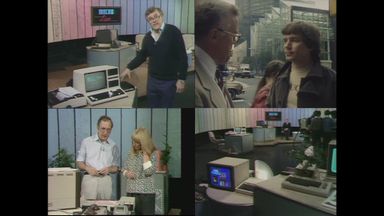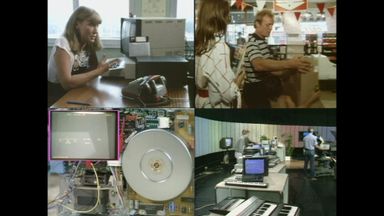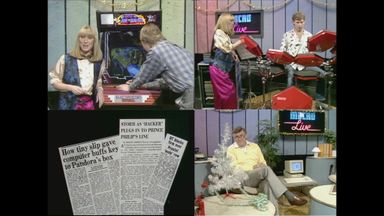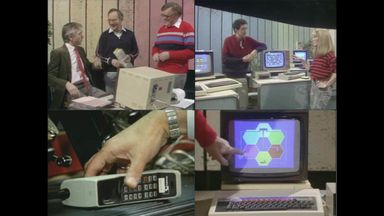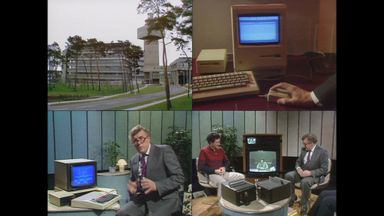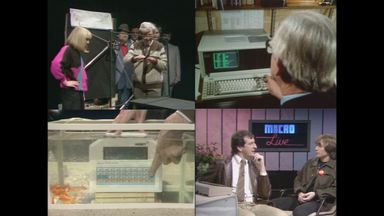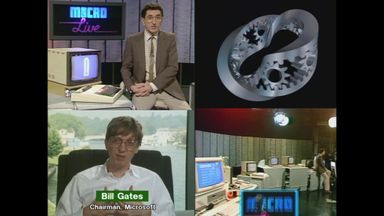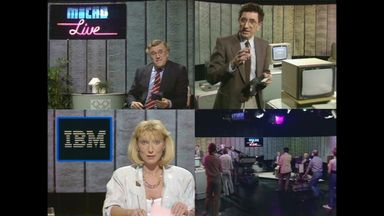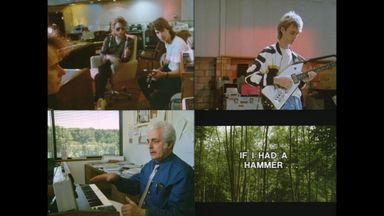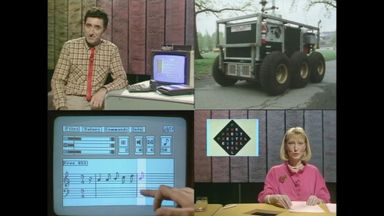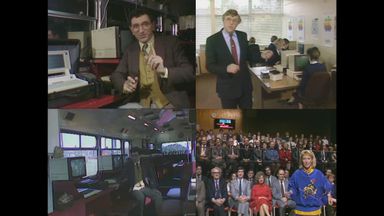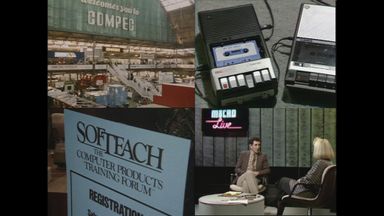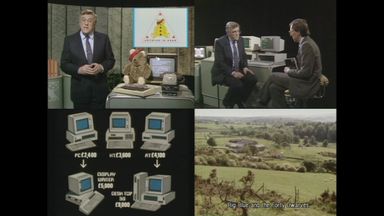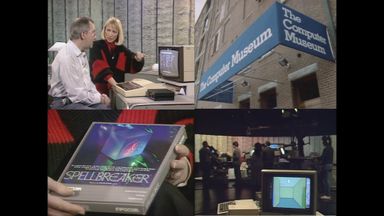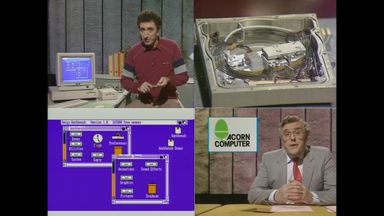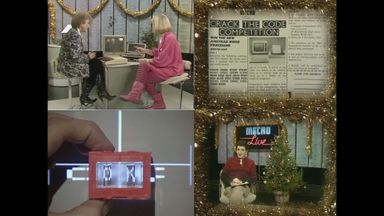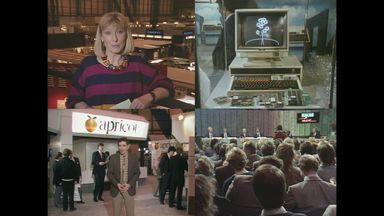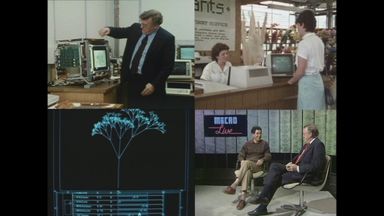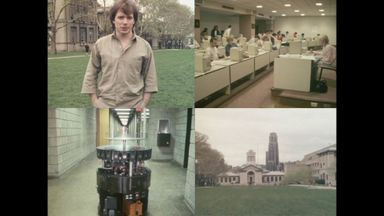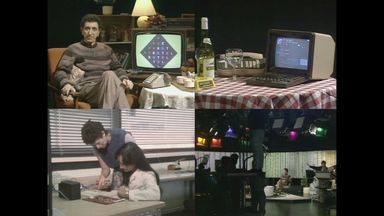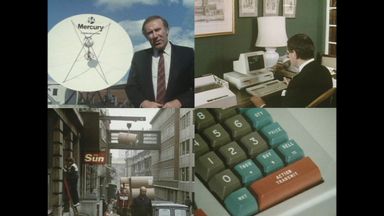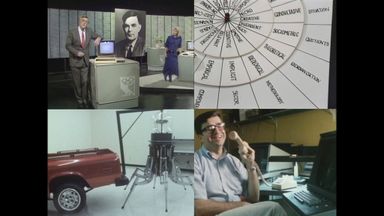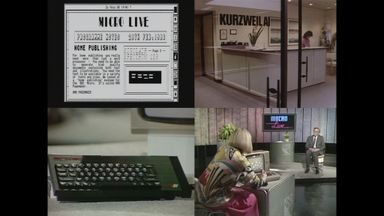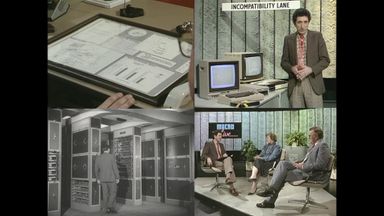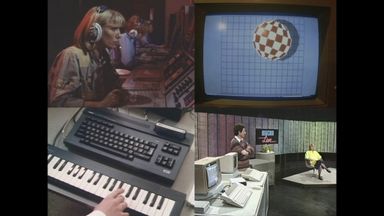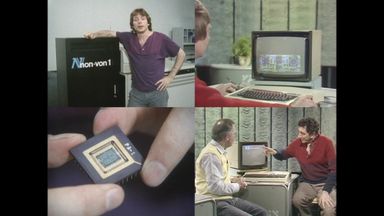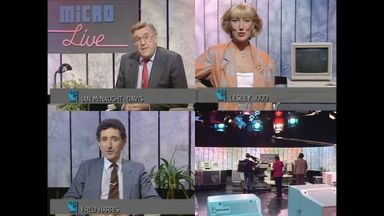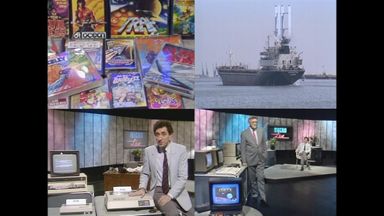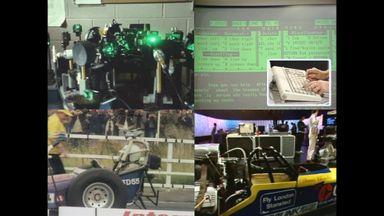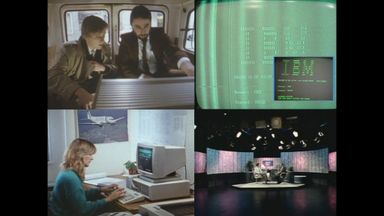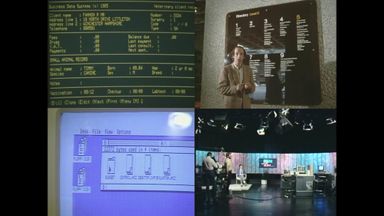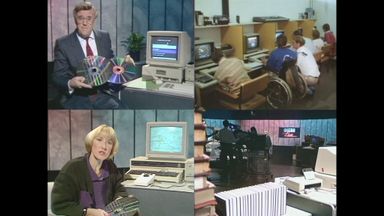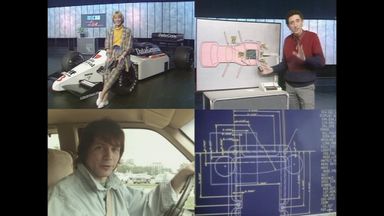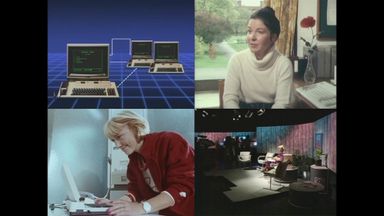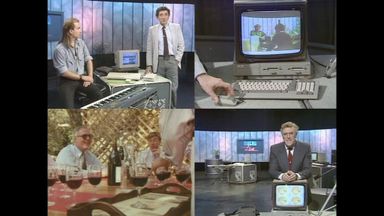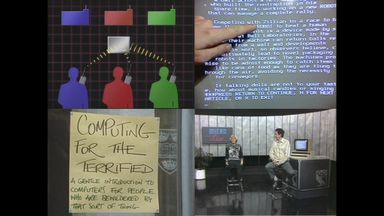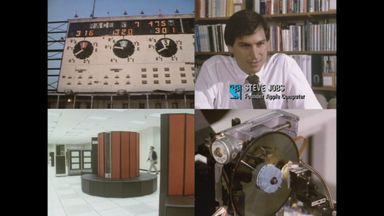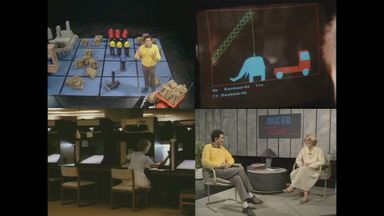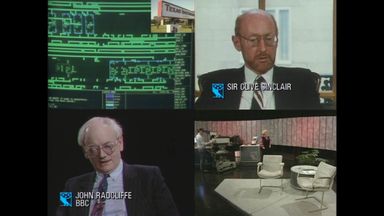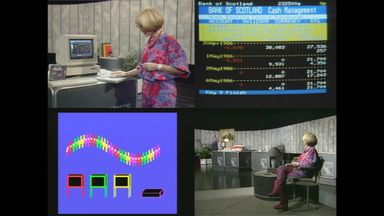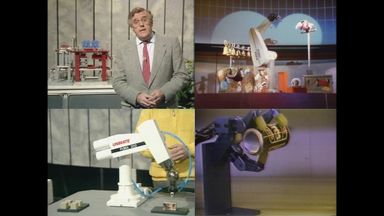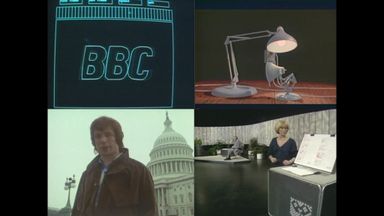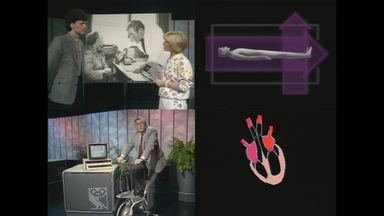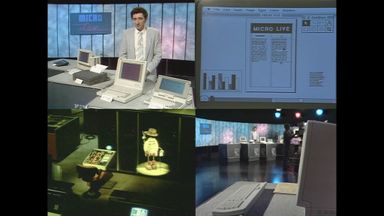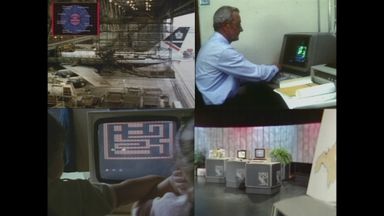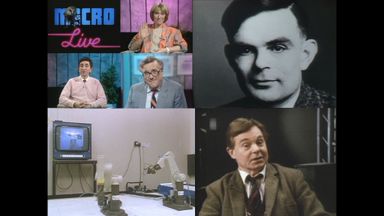Micro Live
11. CMU 2
Clips from this programme
Mac at the dogs/ Greyhound race-track(Harringay) 80 ticket machines to tote board via electro-mechanical processor to huge dials (This Julius Tote system going to the mathematics section of the Science Museum (Doran Swade-Curator of Computing))
Duration: 06:35UK pessimism but not in USA : CMU (Carnegie Mellon University) Intro: from coal & steel to R&D
Duration: 00:37CMU (2) (Carnegie Mellon University) Full Report: from coal & steel to R&D
Duration: 20:43CMU's Cray XMP supercomputer (equivalent to 30,000 IBM PC, $4000 per hour) brute force number crunching with massive waste heat enough to warm the building
Duration: 01:51CMU AI for Chess-Playing with 64 custom chips (Hans Berliner) vs Cray Blitz
Duration: 01:03CMU Organic/ molecular switch for IBM (2 lasers effect colour changes, layered, much faster than electronic switches)
Duration: 02:14CMU 'Funding for research is not a problem' (Richard Cyert, President of CMU)
Duration: 00:16CMU Magneto-optics ($4 million of kit) including new R/W (Read/Write) Compact Discs CD (Professor Mark Kryder)
Duration: 02:54CMU 4000 work-stations for 6000 students > Advanced (3M) workstation (Unix>Andrew WIMP (Windows Icons Mouse))
Duration: 01:00CMU: Steve Jobs left Apple and is now working on new Workstations, what the market needs
Duration: 00:35CMU Tutor for interactive program writing (Bruce & Judith Sherwood) (Simulation demo of cell size)
Duration: 02:45CMU: Steve Jobs' simulation creator programs
Duration: 01:29CMU Literacy and slave data manipulation with Big Data
Duration: 02:16CMU: Steve Jobs' major change in delivery of curriculum for Higher Education
Duration: 00:30CMU System for note taking, Writers' Workbench for suggesting improved writing style / grammar checking
Duration: 02:08CMU: Steve Jobs (non-dogmatic solutions)
Duration: 00:22Micro Live - Series 1
Episode 1
First broadcast: 5th October 1984
Duration 47:01
Ian McNaught-Davis and Lesley Judd present the first programme of a new, live monthly series in which anything that can go wrong, probably will.... American reporter, Freff, visits a 'live-action' movie at the Universal Studios tour in Hollywood and is narrowly saved from being lasered by a dragon. Superstars champion Brian Jacks and his family trudge the streets of beautiful downtown Croydon looking for the perfect computer.... Journalist Chris Palmer looks at the latest software releases: Steven Castell , author of Computer Bluff, comments on the month's news, and John Cole will be along to review the latest computer printers. If you have a modem, you can send messages to the Micro Live Bulletin Board during the show. Director PATRICK TITLEY Producer DAVID ALLEN
Episode 2
First broadcast: 9th November 1984
Duration 45:00
Ian McNaught-Davis and Lesley Judd with news from the world of micros and telecommunications. This month: Brian Jacks reveals which micro he bought for himself and his family; the team try their hardest to corrupt their floppy discs; and, as 'MSX' finally hits the High Street, Chris Palmer examines what it means to the home computer market. British Telecom is well on its way to becoming a private company. By comparison, Freff reports on changes in the American telephone system. What effect will they have on consumers on either side of the Atlantic? Director TERRY MARSH Producer DAVID ALLEN
Episode 3
First broadcast: 7th December 1984
Duration 50:09
Micro Live The first Christmas show on television - and the only one about computers. Lesley Judd and Chris Palmer play computer games - from 'pong', the first-ever arcade game, to the latest laser-disc games from Japan. Ian McNaught-Davis attempts to create a digital Christmas card and talks to Bill Bruford , percussionist with King Cimson, about electronic drum kits. Freff reports from New York on a computer system for making animated cartoons. Plus an update on Brian Jacks and his new computer; news and comment from Matt Nicholson , editor of What Micro; and suggestions for Christmas presents for the computer buff who has everything.... Producers PATRICK TITLEY, DAVID ALLEN
Episode 4
First broadcast: 11th January 1985
Duration 49:29
Ian McNaught-Davis talks to Lynn McTaggart, Editor of Which Computer magazine, about the bad advice you may be given if you go to a High Street store to purchase a business computer. Leslie Judd and Fred Harris look at educational software; there's a visit to a computer camp for young enthusiasts; and the winners of the Micro Live Integrated Software Project will be announced. But why is Freff freezing on top of a skyscraper in New York with only a cellular radio telephone for company? Director TERRY MARSH Producer DAVID ALLEN
Episode 5
First broadcast: 8th February 1985
Duration 49:25
On the road! This month's programme comes live from the British Telecom Research Laboratory at Martlesham Heath, near Ipswich. Ian McNaught-Davis looks at some of the latest developments in telecommunications, and talks to John Alvey , Chairman of the Alvey Committee and Engineer-in-Chief for BT. American reporter Freff joins in from New York on a new 'teleconference' system, and he has the latest micro news from America. And Lesley Judd and John Coll report from the recent Which? Computer show in Birmingham. Producer PATRICK TITLEY Series producer DAVID ALLEN
Episode 6
First broadcast: 8th March 1985
Duration 49:18
with lan McNaught-Davis and Lesley Judd. In this, the last programme of the current series, Lesley investigates new applications for the laser disc. Mac challenges a robot at its own game, table tennis. Fred Harris reviews some portable and lap-held computers. And a look at the difficult job of live subtitling... Director TERRY MARSH Series producer DAVID ALLEN
Micro Live - Series 2
Episode 1
First broadcast: 11th October 1985
Duration 29:29
The only live computer programme on television returns for a new, weekly series. Lesley Judd previews the entries in next week's Computer Animation Film Festival competition, with exclusive clips of the latest and best in computer graphics. Ian McNaught-Davis and American reporter Freff examine the ups and downs of the computer industry since the last series. Plus news of an investigation into the shady world of the cowboy computer maintenance companies, and Fred Harris explains how speech synthesiser add-ons to home micros can be used. Director PATRICK TITLEY Series editor DAVID ALLEN
Episode 2
First broadcast: 18th October 1985
Duration 29:37
Every day millions of industrial, commercial and military secrets travel around the world by cable and satellite ... a spy's dream. How secure are modem computer systems? Is computer-bugging a hacker's prank or professional international espionage? Fred Harris joins the army on manoeuvres and discovers whether data is secure on the battlefield. Ian McNaught-Davis explains how data encryption works. and there's news of THE LISTENER Crack the Code competition and its prizes. Lesley Judd casts an eye over the winners of the Computer Animation Film Festival with John Vince, one of the judges. Director TERRY MARSH Series editor DAVID ALLEN
3. If I Had a Hammer
First broadcast: 25th October 1985
Duration 29:26
If I Had a Hammer ... A film about computers in the music industry . Narrated by Lesley Judd. Few rock and pop records are made today without the help of sophisticated computer-based synthesisers. They can reproduce the sound of virtually any instrument and replay strings of notes more accurately than session musicians. This film traces their development from the 19th-century Telharmonium to the Fairlight Computer Musical Instrument. 'It doesn't make you a better carpenter because you can bash in nails with your fist,' says music producer MARTIN RUSHENT. 'The smart guy uses a hammer.' Film editor HORACIO QUEIRO Producer PATRICK TITLEY
Episode 4
First broadcast: 1st November 1985
Duration 29:41
A look at new developments in information technology. The doomed Three Mile Island reactor in Pennsylvania is the focus for work on artificial intelligence by the robotics department of nearby Carnegie Mellon University. American reporter Freff looks at some of the problems involved in designing robot vehicles which can move around on their own, recognise objects and do useful work. The aim: to clean up the radioactive interior. Fred Harris makes the most of music on the micro while Lesley Judd finds out why holding personal data on your computer will probably mean sending E22 to an address in Cheshire. Director PATRICK TITLEY Series editor DAVID ALLEN
5. Garth Hill School OB
First broadcast: 8th November 1985
Duration 44:43
Every primary and secondary school in Britain has a computer. No other country in the world can make that boast. In March the Government is axing the Microelectronics Education Programme (MEP), its replacement, Microcomputer Support Unit, will have half the budget. This week's programme comes direct from a secondary school in Berkshire and examines the role of computers in schools. Lesley Judd asks why the Government is cutting back school software. Ian McNaught-Davis discovers how chalk and talk is giving way to bits and bytes. Fred Harris goes for a ride on a computer bus. Director TERRY MARSH Series editor DAVID ALLEN
Episode 6
First broadcast: 15th November 1985
Duration 29:32
Lesley Judd , Fred Harris and Freff report on the world of information technology. This week: a look behind the scenes at one of the world's most successful games software companies. Fred Harris takes a further look at how to make music on your home micro, and Freff reports on an American company that has spent $15 million setting up a kind of technological Aladdin's cave to project its image to both employees and customers. Studio director ALAN GRIFFITHS Series editor DAVID ALLEN
7. Impact of IBM on Computers
First broadcast: 22nd November 1985
Duration 30:04
Big Blue and the 40 Dwarves IBM, known as Big Blue, is the largest computer company in the world - ten times the size of its nearest rival. Its first personal computer was so successful that it set a technical standard. Forty other manufacturers now use IBM standards in designing their machines. Ian McNaught-Davis finds out if, now they are embracing Big Blue's standards, the 40 dwarves can get out of its clutches. Director ALAN GRIFFITHS Series editor DAVID ALLEN
Episode 8
First broadcast: 29th November 1985
Duration 29:57
A look at new developments in information technology by the only live computer programme on television. Boston, Massachusetts has the only museum in the world in which all the exhibits are less than 40 years old. American reporter Freff, who is also less than 40 years old, visits the Computer Museum, and discovers a very important teapot.... Also from Boston, there's a behind-the-scenes look at the computer games company Infocom, the people who invented Interactive Fiction. And, in the studio, Fred Harris reviewsCommodore's new micro, the AMIGA, and Lesley Judd talks to John Coll about stops, starts and parity bits. Studio director TERRY MARSH Producer PATRICK TITLEY
Episode 9
First broadcast: 6th December 1985
Duration 29:39
A look at new developments in information technology. American reporter Freff risks using a computer database before buying a painting in a New York antique shop. Fred Harris explains how the home micro can be used to communicate with other computers down the telephone line. Ian McNaught-Davis takes a trip down memory lane to explain the way that computer storage devices have developed over the years. And, looking forward, Freff visits an American research team who are developing 'super memories' that use lasers to read and write data onto protein molecules. Studio director PATRICK TITLEY Series editor DAVID ALLEN
10. Xmas
First broadcast: 13th December 1985
Duration 29:25
The last of the present series of reports on the new developments in information technology. Ian McNaught-Davis Lesley Judd and Fred Harris with the Christmas micro show. Freff visits the New York Institute of Technology Computer Animation department and checks out the break-dancing fractal trees; a chorus-line of robots exhibit their domestic prowess; and Ann Leslie of the Daily Mail looks at some word processing packages. John Coll takes a look at Christmas presents for computer addicts, and Dick Gilbert announces the results of THE LISTENER Crack the Code competition. Studio director PATRICK TITLEY Series editor DAVID ALLEN
11. Which Computer Show
First broadcast: 17th January 1986
Duration 29:32
The first Micro Live of 1986 comes from the computer industry's most important exhibition - this week's Which Computer? show, at the National Exhibition Centre, near Birmingham. Ian McNaught-Davis and Fred Harris look at some of the new products and software on display, and Lesley Judd presents the Micro Live RITA awards for achievement in Information Technology. Some of the industry's personalities, including Sir Clive Sinclair , face up to the Micro Live version of Any Questions? Directors TERRY MARSH, TREVOR TAYLOR Producer PATRICK TITLEY
Episode 12
First broadcast: 24th January 1986
Duration 29:12
This week Micro Live visits a garden centre which uses a database to help its customers find the plants they need and Fred Harris explains how to use a database on a home micro. From America, Freff reports on the fascinating world of fractals and Ian McNaught -Davis takes a look at a promising new British development in flat-screen technology. Studio director ALAN GRIFFITHS Series editor DAVID ALLEN
13. CMU 1
First broadcast: 31st January 1986
Duration 29:36
A weekly look at the world of computers and information technology with Ian McNaught-Davis and Fred Harris. From America, Freff reports from Pittsburgh, Pennsylvania, where Carnegie Mellon University is engaged in a massive computer project. The buildings in the university are being linked by fibre optic cable. Individual students will be required to have a computer and even to have access to the computer network from their rooms. Studio director TREVOR TAYLOR Series editor DAVID ALLEN
Episode 14
First broadcast: 7th February 1986
Duration 29:37
A live look at new developments in information technology. Is Prestel a world-beating information service or just a hacker's delight? Fred Harris investigates British Telecom's dial-up service, and compares it with the French system, Minitel. Lesley Judd trys out a micro-based system for training RAF air-traffic controllers, and visits a disused bra factory in the Cardiff docklands. Studio director TERRY MARSH Producer PATRICK TITLEY
15. Electronic Information (Andrew Neil)
First broadcast: 14th February 1986
Duration 29:29
A weekly look at the world of computers and information technology. Long Distance Information Electronic information is changing the way we do business - forcing even the most ancient British institutions to update themselves. Andrew Neil , Editor of the Sunday Times, gives a special report on the way that the Stock Exchange, Fleet Street and the legal profession are falling dangerously behind as they struggle to keep pace with the booming electronic Information market. Eddy Shah talks about new opportunies to start your own newspaper; a leading barrister admits that now the law is electronic he makes fewer mistakes; while a computer programmer from the Stock Exchange is afraid that his work will destroy the Exchange's famous trading floor. Director ALAN H GRIFFITHS Series editor DAVID ALLEN
16. AI & Expert Systems
First broadcast: 21st February 1986
Duration 29:35
In this week's programme on Artificial Intelligence, Ian McNaught-Davis asks if the computer will ever be able to make judgments, learn from its mistakes, or write creatively. Freff visits a computer in New York's Greenwich Village that has just published its first book of poetry, and Lesley Judd tries the Turing test - to find out if she's working with men or machines! Studio director TERRY MARSH Series editor DAVID ALLEN
Episode 17
First broadcast: 28th February 1986
Duration 29:51
Imagine a machine that can read out loud from any book or magazine; or a synthesiser that can reproduce the sound of an entire orchestra. Both were invented by Ray Kurzweil ... Freff reports from Boston. Lesley Judd tries out some software that lets you be your own Robert Maxwell. ... And Ian McNaught-Davis finds out why a £25,000 car needs ten computers to keep it going. Studio director ALAN GRIFFITHS Producer PATRICK TITLEY
Episode 18
First broadcast: 7th March 1986
Duration 30:13
Computers have undoubtedly changed the way many people work since they were first introduced into business in the 1950s. Technology is poised to be much more widely used and to change some jobs hitherto seen as 'safe' - including those in the professions. Speculating with Ian McNaught-Davis and Fred Harris about the future effects of computers on work, are The Rt Hon Shirley Williams, who is also a director of the Turing Institute for artificial intelligence, and Bob Latin of Standard Telephones and Cables. Studio director TERRY MARSH Series editor DAVID ALLEN
Episode 19
First broadcast: 14th March 1986
Duration 29:41
Training an RAF air traffic controller costs around £86,000. Lesley Judd tries out the multi-million-pound simulator at RAF Shawbury, and reports on a new micro-based training aid that will soon be installed in control towers around the country. How many languages do you speak? Most home micros come with only one - BASIC. It's fashionable to knock BASIC, so Fred Harris considers learning some other languages, like PASCAL, LOGO and C. And a music teacher in Reading explains how a computer has revolutionised her lessons. Studio director ALAN HAYDN GRIFFITHS Producer PATRICK TITLEY
Episode 20
First broadcast: 21st March 1986
Duration 29:39
In the last programme of the series, Fred Harris talks to John Coll about the meaning of 'benchmarks', and contrasts the performance of the Commodore Amiga with the Atari 520ST. American reporter Freff explains why the computers of the future will have to be capable of doing many things at once. Ian McNaught-Davis looks at the British 'Transputer'. And Lesley Judd tries to fool a system that remembers and recognises faces. Producer PATRICK TITLEY Series editor DAVID ALLEN
Micro Live - Series 3
Episode 1
First broadcast: 17th October 1986
Duration 29:36
The weekly look at the world of information technology with Lesley Judd Ian McNaught-Davis and Fred Harris. The home-computer industry has recently seen important changes of fortune for some of its major players, including Sir Clive Sinclair , Alan Sugar of Amstrad, and Bryan Long of Acorn. Their views, plus a look at the latest hardware and software, make up an assessment of changes since the last Micro Live back in March. Also a review of do-it-yourself computer animation software and then, hot-footing it from this year's Computer Animation Film Festival ceremony, Lesley Judd reviews the best of this year's mainframe masterpieces. Producers PETER BRATT and TERRY MARSH Series editor DAVID ALLEN
Episode 2
First broadcast: 24th October 1986
Duration 30:08
The weekly programme on information and computer technology. Fred Harris looks at some of the best games for the home micro - including those which involve more than mindlessly 'zapping' aliens - from the electronic version of "Trivial Pursuit' to a game that tests your knowledge of physics and allows you to design your own pin-ball machine. Ian McNaught-Davis tells the sad story of the Wingsail - an ingenious computer-controlled sail which when bolted to a ship saves a tenth of its fuel bill, but has almost ruined its inventor. And award-winning journalist Steven Arkell reports from the City of London on the technology, and the mistakes, behind the 'Big Bang'. Studio director ALAN HAYDN GRIFFITHS Producer TERRY MARSH Series editor DAVID ALLEN
Episode 3
First broadcast: 31st October 1986
Duration 29:48
The weekly look at information technology - with Lesley Judd and Fred Harris. Choosing a word processor? Advice on how to get what you really need. Are computers going to the dogs? Harringay stadium is one of the few tracks which haven't replaced their electromechanical tote system with a computer. And tomorrow's computers, will they run on laser light rather than electricity? Studio director DAVE THOMAS Producer PETER BRATT Series editor DAVID ALLEN
4. Snooping & Micros for Small Businesses Pt1
First broadcast: 14th November 1986
Duration 29:31
The weekly look at the world of information technology. Miami city managers have commissioned a new system of computerised radios that can be reprogrammed from headquarters - particularly useful for the police. If you run a small business and are considering a computer Ian McNaught-Davis and Kathy Lang from "Personal Computer World" give some basic advice. And a unique project in Northamptonshire where programmers in a sheltered workshop are writing software for an adult training centre.
5. Snooping & Micros for Small Businesses Pt2
First broadcast: 21st November 1986
Duration 29:30
The weekly look at the world of information technology - with Fred Harris and lan MeNaught-Davis. Finding your way around a computer system can be frustrating; psychologist Professor David Canter explores the endless corridors of unfriendly operating systems. All software great and small in a country practice - vet John Drew 's specialist business needs. And a look at Life-Card, a new kind of 'read/write' optical storage device on a credit card. It's soon to be introduced into the wallets and purses of 85 million Americans to hold medical information which could be vital in an emergency. Studio director TERRY MARSH Producer PETER BRATT Series editor DAVID ALLEN
Episode 6
First broadcast: 28th November 1986
Duration 29:24
With Lesley Judd and Ian McNaught-Davis. Twelve-inch laser discs had a short, unsuccessful life for domestic video, but the smaller compact discs have really taken off. Now discs similar to CDs can be used to store data for computers. But the larger video discs are making a come-back in 'interactive' systems, such as the one launched this week by the BBC's Domesday Project and are potentially ideal for education and training. If primary schools don't yet have video disc players at least most of them do have a computer. British educational software leads the world, but lack of teacher training and resources may mean it is simply not used. Kenneth Baker , Secretary of State for Education, spearheaded the introduction of computers in schools when he was Minister for Information Technology. Now he faces his critics over the lack of follow-up. Studio director DAVE THOMAS Producers TERRY MARSH and PETER BRATT Series editor DAVID ALLEN
7. Microprocessor Revolution in Cars
First broadcast: 5th December 1986
Duration 29:42
Fred Harris and Lesley Judd look at the increasing use of computers in cars and show how the Rover Sterling uses a micro to control everything from its fuel supply to its anti-lock braking. With so many electronic devices appearing in some cars the manufacturers are looking for other solutions to the problem of how to connect the electrics together. On the racing circuit, Tyrrell cars demonstrate how higher speeds are achieved by designing their cars on computer. And from America, Freff reports on ETAK, a remarkable car navigation system which shows a driver exactly where he is on a street plan which moves in front of his eyes on a screen as the car moves along the road. Also from the States, a simple touch screen which will do away with most of the levers and knobs which hang off a car's dashboard. Studio director ALAN HAYDN GRIFFITHS Producer PETER BRATT Series editor DAVID ALLEN
8. Email
First broadcast: 12th December 1986
Duration 29:28
The weekly look at the world of information technology. A recent survey showed that about 70 per cent of telephone calls fail to get through - either because numbers are engaged or people aren't at their desks. The consumers' magazine Which reported that two in five first-class letters don't get there the next day; and people doing business with, say, Australia or California can find virtually no time when both they and their business contacts are at their desks. Faced with these frustrations, many people are turning to electronic mail - including 'voice mail' - to get their messages across. Electronic mail systems offer the chance for people to send written documents immediately to their offices over the phone, from home or from anywhere in the world. Increasingly the systems also offer - at a price - access to databases such as World Reporter and the Official Airlines Guide. This week's programme looks at this fastest-growing use of the personal computer, expanding at a rate of 100 per cent a year. One commentator says that 'E-mail' may rival the use of the telephone by 1995. Studio director PETER BRATT Producer TERRY MARSH Series editor DAVID ALLEN
9. Xmas
First broadcast: 19th December 1986
Duration 29:38
With Lesley Judd Fred Harris and Ian McNaught-Davis This week the latest hardware and software for creating music on micros, a look at an amazing new driving simulator just arrived in this country which was the sensation of the recent Tokyo Electronics Show, and from California comes a story of a wine grower who is trying to use computer-controlled analysis equipment to discover what makes a good wine. Studio director ALAN HADYN GRIFFITHS Producers PETER BRATT. TERRY MARSH Series editor DAVID ALLEN
Episode 10
First broadcast: 17th January 1987
Duration 28:50
The weekly look at information technology with Lesley Judd and Fred Harris Miami has the dubious distinction of being America's drug capital and one of the most difficult cities in the world to police. Now a new system, using computerised portable radios that can be programmed from headquarters, is helping in the fight against crime. In Oxford, Kittredge Cowlishaw runs a unique course called 'Computing for the Terrified'. One of the applications the students are introduced to is the 'spreadsheet' - the software which has probably sold more computers than any other. Micro Live shows the basics of how to use one. Studio director DAVE THOMAS Producers TERRY MARSH. PETER BRATT Series editor DAVID ALLEN
11. CMU 2
First broadcast: 24th January 1987
Duration 29:43
With Lesley Judd. Are computers going to the dogs? Harringay Stadium is one of the few tracks which hasn't replaced its electro-mechanical tote system with a computer. American reporter Freff visits Pittsburgh's Carnegie Mellon University, one of the key centres in computing research. Rock-eating robots, world-beating chess machines, a Cray supercomputer - you name it, CMU probably has it. Film editor IAN MCKENDRICK Directors STEVE LOWRY. DAVID HARRISON Series editor DAVID ALLEN
Now playing
Episode 12
First broadcast: 31st January 1987
Duration 29:09
The weekly look at the world of information technology with Lesley Judd and Fred Harris. This week's programme includes a visit to Salt Lake City, Utah, headquarters of the Mormon Church. The Mormons believe that if they convert you to Mormonism, they will convert all of your ancestors. This has led them to create the largest genealogical database in the world. They are now transferring all this information onto a computer network so that it will be available to everyone with a home micro. Studio director ALAN HADYN GRIFFITHS Producer TERRY MARSH
Episode 13
First broadcast: 7th February 1987
Duration 28:46
The weekly look at the world of information technology with Lesley Judd and Fred Harris. Customised chips - complex and specialised chips for specific needs - used to be very expensive. But now there is a way of producing them cheaply. In an exclusive interview Sir Clive Sinclair gives an insight into past successes and failures and looks forward with new plans for the next generation of computers. Four- and 5-year-olds are now getting hands-on experience of computers in nursery classes. Studio director DAVID HARRISON Producers PETER BRATT , TERRY MARSH Series editor DAVID ALLEN
Episode 14
First broadcast: 14th February 1987
Duration 29:27
The BBC and the ITV companies used to disagree cordially when it came to audience figures. But recently they joined forces and turned to electronics to measure the ratings. Fred Harris finds out if the numbers are more reliable. The Veterans Association runs hospitals in the US for members of the armed forces injured in action. Lesley Judd investigates a project at Stanford University where engineers and philosophers are working with the VA to create a robot that will be of real use to disabled ex-servicemen. Studio director ALAN HAYDN GRIFFITHS Producers PETER BRATT, TERRY MARSH Series editor DAVID ALLEN
15. Robots
First broadcast: 21st February 1987
Duration 29:59
With Ian McNaught-Davis and Fred Harris. Robots Special: The humanoid robots of fiction and today's industrial robots are as far from each other as chalk from cheese. But slowly robots are being incorporated into systems capable of bringing some of the flexibility of man on to the factory floor. Robotics scientists are making great headway in giving robots vision, touch and even the ability to play a mean game of table tennis. Explaining developments is Professor Mike Brady , who recently returned to Britain from one of America's leading technological universities to run an Oxford research team. Research DAVID HARRISON Studio director DAVE THOMAS Series editor DAVID ALLEN
Episode 16
First broadcast: 28th February 1987
Duration 29:27
With Lesley Judd and Ian McNaught-Davis. From Washington Freff investigates the way that American politicians use computerised direct mail to target key groups of voters. The technique is so effective that it is now an essential part of US political campaigning. Could it happen here? Also the best and the latest computerised film animation from the Imagina Conference at the Monte Carlo Television Festival, where Hollywood film-makers and academic researchers recently showed their work. Studio director ALAN HADYN GRIFFITHS Producers PETER BRATT. TERRY MARSH Series editor DAVID ALLEN
17. Medicine and Computers
First broadcast: 7th March 1987
Duration 29:27
The weekly look at the world of information technology with Lesley Judd and Ian McNaught-Davis. This week an examination of the use of computers and microelectronics in the world of medicine - the successes, the failures and the ideas still waiting for trial, including superb new diagnostic tools for the future. But will the NHS be able to afford them? From America, a robot being instructed in plain English might eventually be used to help disabled Vietnam war veterans. And an examination of medical software for the home micro - some of it good and some of it very bad. Studio director ALAN HAYDN GRIFFITHS Producers PETER BRATT , TERRY MARSH Series editor DAVID ALLEN
Episode 18
First broadcast: 14th March 1987
Duration 29:55
With Fred Harris and Ian McNaught-Davis. The Epcot Center in Florida is next door to Disneyworld, but it's not just there for entertainment. It was the last great dream of Walt Disney and it's designed to give the visitors who flock through it every day an image of past, present and future. Micro Live takes a look 'backstage' at the computers in control. The technologies of computerised graphics, text processing and printing are being brought together in a new way that allows almost anyone to do their own desktop publishing. Micro Live assesses the competing systems that claim to turn a home micro into a mini Fleet Street. Studio director DAVE THOMAS Producers PETER BRATT. TERRY MARSH Series editor DAVID ALLEN
Episode 19
First broadcast: 21st March 1987
Duration 29:42
The weekly look at the world of information technology with Lesley Judd and Fred Harris. If you book an airline ticket you're likely to be in the hands of a computer until you pick up your luggage at the other end. Micro Live investigates the system. When the Torrey Canyon sank in the English Channel 20 years ago this week, the oil it spilled caused great damage to the coast and to wildlife. If it happened today, a computer model would be used to speed up decisions on how to fight the disaster. Micros have become a familiar sight in our schools, but they may become as familiar in the nursery. Studio director DAVE THOMAS Producers PETER BRATT, TERRY MARSH Series editor DAVID ALLEN
Episode 20
First broadcast: 28th March 1987
Duration 29:36
The weekly look at the world of information technology with Lesley Judd , Fred Harris and Ian McNaught-Davis In the last, extended edition of the series, Micro Live visits the Haymarket Theatre and the world of Alan Turing , the father of modern computing, portrayed by Derek Jacobi in the stageplay Breaking the Code. Turing's computers in the 1940s and 1950s were 'first-generation' machines; now computer scientists are working on the 'fifth generation'. In Scotland the institute named after Turing has a world reputation in artificial intelligence work, but its software products are hardly used in the UK. In California, where seemingly limitless sums are thrown at research projects, 'Chinese temples', brainstorming' and robots for war veterans are the subjects of fifth generation work. Dr Ian Page of Oxford University puts such present and future work in perspective. Studio director TERRY MARSH Producer PETER BRATT Series editor DAVID ALLEN



















